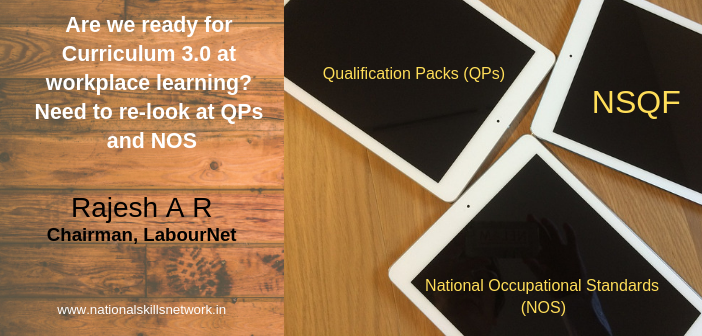
If performance at the workplace is the key to individual prosperity and business success, how often do we revisit our ways of building competencies by recognizing the social and non-formal ways of learning? Though work integrated learning is gaining popularity, it is solely confined to NSQF compliant technical and vocational courses, apprenticeships or degree courses like B.Voc. The rigidity of curriculum, as per Qualification Packs comprising National Occupational Standards (NOS) needs an immediate re-look.
Going by one of the tenets of Education 3.0, social construction of knowledge and its acknowledgement have a big role to play in preparing the present and future workforce. The scope of performance and knowledge criteria for each NOS should value the knowledge gained through social interactions of the workforce with the team member, friends, superiors and customers. This is because today’s workplace demands people to be adept with a holistic understanding of the profession, rather than fulfill a typical job role.
Curriculum 3.0 recognizes the dynamic nature of the industry and opens up many avenues to broaden the knowledge base of the workforce. It resonates with the Latin origins of the term ‘curriculum’, meaning ‘to run a course’ which in turn could be interpreted as a marathon with signposts, milestones, facilitators, coaches and others. Social construction of knowledge extends this metaphor by preparing workforce for a career, just like a marathon, rather than a job role or a 100 meters sprint.
 To understand it better, bet’s look at the National Occupational Standards (NOS) for a job role in the Painting industry. The Qualification Pack for the role of a Decorative Painter, lists down NOS’ like managing customer interaction, painting manually or using a machine an so on with detailed description of the performance elements. Since NOS’ are the industry benchmarks, the training programs would follow them the prescribed format and through theory and practical session, the knowledge is imparted in a linear, top-down manner. Let’s place this example in the context of learning that happens through informal means and how knowledge gets constructed socially.
To understand it better, bet’s look at the National Occupational Standards (NOS) for a job role in the Painting industry. The Qualification Pack for the role of a Decorative Painter, lists down NOS’ like managing customer interaction, painting manually or using a machine an so on with detailed description of the performance elements. Since NOS’ are the industry benchmarks, the training programs would follow them the prescribed format and through theory and practical session, the knowledge is imparted in a linear, top-down manner. Let’s place this example in the context of learning that happens through informal means and how knowledge gets constructed socially.
If you revisit the role of the Decorative Painter, you may find that some of these painters have already acquired skills and knowledge through their friends, family who are in the same profession through interactions and observation. In fact, they would have widened their skill sets beyond the prescribed curriculum for a particular job role. This process of social construction of knowledge has a great potential to address some key challenges in work-integrated learning to make it holistic and relevant. Let’s look at three below:
Value socially constructed knowledge
Learning from peers or learning by informally working under a master craftsman or learning through trial and error involves a close connection with the social realities of workplace. In fact this form of learning is more effective when solving real workplace issues. The painter could try out something that was not a part of the formal training curriculum by using his social repertoire of skills and knowledge and same would be the case with many workers who are surrounded by skilled co-workers and family members. How do we acknowledge this knowledge in order to make it a part of the holistic curriculum? To answer this question, we need to adapt the current framework of QP-NOS to recognize socially learned behaviours that further adds to the competence levels.
Address the dynamic needs of the industry
Even though NSQF based training curriculum is coordinated by the Sector Skill Councils (SSC) it is remains just an exit point for a job role. The methodology and the delivery models need to be in sync with the industry. To cope with the changing requirements, we need to add elements of competence that match with current needs. For instance, in the case of the painting industry, the influence of technology such as smart painting technology for the safety of the workforce could necessitate a collaborative approach where the experts can share their knowledge with the workers thought innovative channels of learning. Or the workers can learn by interacting with their superiors. And, this gets documented and recognised as a curricular component and becomes a part of knowledge repository, thus making it flexible and adaptable.
Recognition of socially constructed knowledge for formal qualifications
A Diploma or a Degree awarded through work-integrated learning can be enriched through formalization of social knowledge. Think of the painter who had started working after completing his 8th standard and with years of experience, become highly knowledgeable. What if he could covert his experience into credits after formal assessments? Perhaps he would be eligible for a Diploma and by fulfilling partial requirements and it reflects on his confidence levels and improves performance. Our curriculum and assessment frameworks have to soon integrate with such flexible forms of recognition.
Unlike the previous generations that perceived knowledge as something handed over or learning as a process of one-way interaction, today we are surrounded with opportunities to learn, earn and grow. By accommodating social forms of learning, we not only accelerate the process of real knowledge creation but also bring many into the formal fold of higher education.




